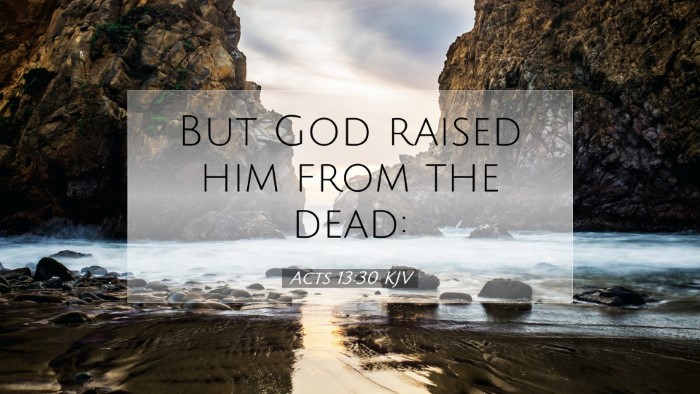Acts 13:30 Commentary
Bible Verse: "But God raised him from the dead." (Acts 13:30)
Introduction
This verse is a powerful proclamation and forms a crucial part of the apostolic preaching in the Book of Acts. It encapsulates the core of Christian faith—the resurrection of Jesus Christ. Commentators throughout history have examined this verse to highlight its theological implications and the foundation it provides for Christian doctrine.
The Context of Acts 13:30
The context of this declaration is essential for understanding its weight. In Acts 13, Paul delivers a sermon in Pisidian Antioch, recounting the history of Israel while culminating in the resurrection of Jesus. Scholars like Matthew Henry have emphasized that Paul’s approach to preaching included both a recounting of the Old Testament and a fulfillment in Christ, demonstrating that the resurrection is not an isolated event but a pivotal moment in God's redemptive history.
Historical Background
This section of Acts provides a vivid historical backdrop that situates the significance of Christ's resurrection within the Jewish tradition. Albert Barnes notes that Paul's sermon is aimed at both Jews and Gentiles, establishing a link between their shared history and the universal message of the gospel. The resurrection articulates a shift from the Law of Moses to grace, thus appealing to both audiences for a broader understanding of salvation.
Theological Significance
The assertion that "God raised him from the dead" carries profound theological weight. Adam Clarke emphasizes that this act demonstrates God's authority and vindication of Jesus Christ. The resurrection confirms Jesus as the Messiah and authenticates His teachings. Furthermore, the resurrection is a cornerstone within the Christian faith that heralds the victory over sin and death.
Resurrection as a Central Tenet of Christianity
- Proof of Divine Authority: The resurrection is presented as God's definitive endorsement of Jesus as Lord (Romans 1:4).
- Foundation for Salvation: As noted by Henry, without the resurrection, the Christian faith would lack its substance, as Paul affirms in 1 Corinthians 15:14.
- Hope of Eternal Life: The resurrection promises believers a future resurrection, underpinning the entire New Testament theology of hope (1 Thessalonians 4:14).
Application for Believers
The application of Acts 13:30 is vital for today's believers. The affirmation of life after death speaks directly to the fears and uncertainties faced by humans. Barnes maintains that acknowledging the resurrection leads to deeper faith, as it encourages believers to trust in God’s power to transform their lives.
Encouragement in Preaching
Pastors and theologians can find encouragement in this verse when proclaiming the gospel. Preaching about the resurrection should be central to any message, assuring congregants of God's faithfulness and the reality of Jesus’ victory over death.
Conclusion
Acts 13:30 serves not only as a historical account but also as a theological fulcrum for understanding Christian doctrine. Engaging with this scripture, as elucidated by commentators such as Matthew Henry, Albert Barnes, and Adam Clarke, inspires confidence in the resurrection as the cornerstone of faith and a source of hope for every believer. As we reflect on this powerful proclamation, may we embrace its implications in our preaching, teaching, and daily living.


